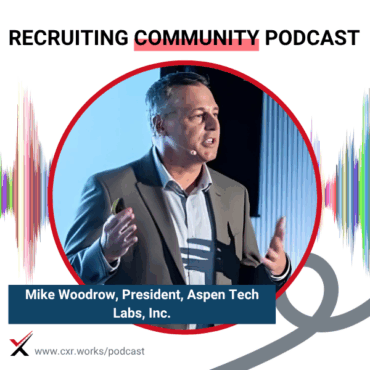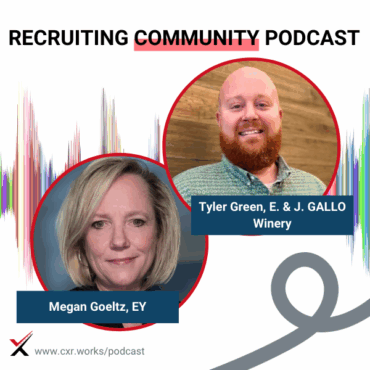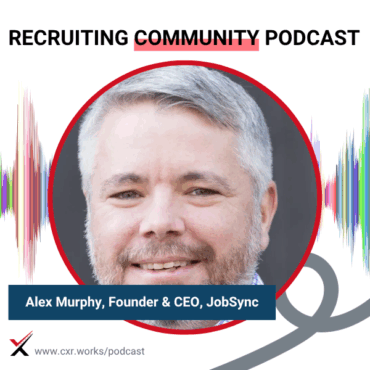
Conflicts of Interest in Talent Acquisition
What happens when financial incentives aren’t disclosed in recruiting? This episode explores how conflicts of interest impact trust and decision-making in TA.
 play_arrow
play_arrow
Balancing Strategy and Tactics: Melissa Thompson’s Career Crossroads Cami Grace
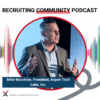 play_arrow
play_arrow
Real-Time Jobs Data and the TA Advantage Cami Grace
 play_arrow
play_arrow
20+ Years at Dell and Beyond: Jennifer Newbill’s Career Crossroads Cami Grace
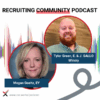 play_arrow
play_arrow
AI Interview Research Cami Grace
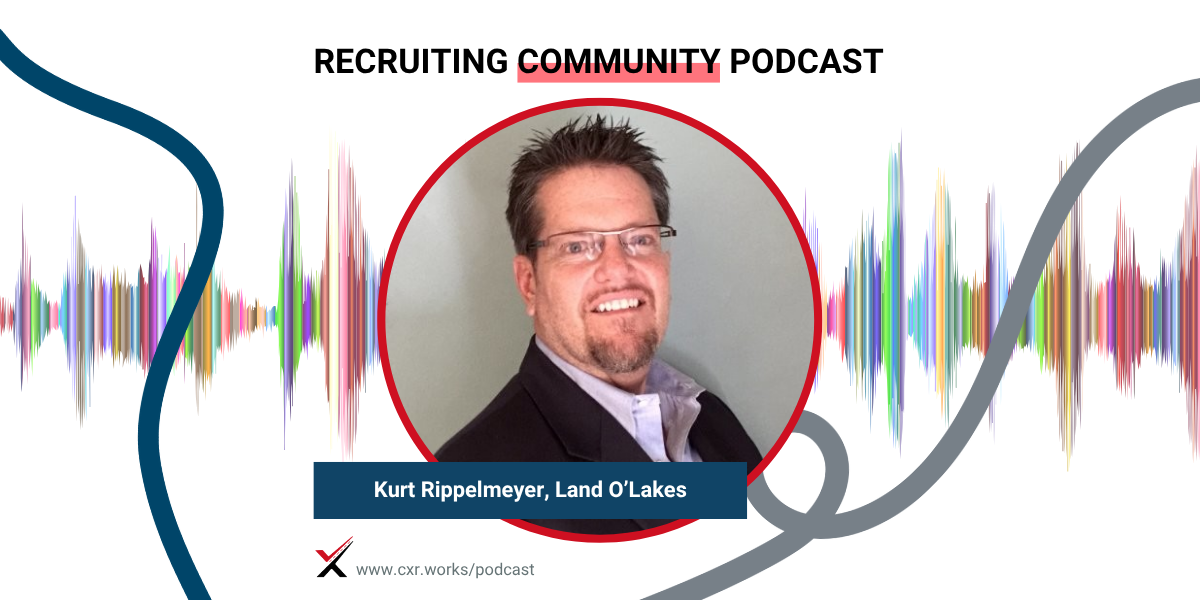
Episode Overview:
In this episode of the CXR Podcast, Kurt Ripplemeyer from Land O’Lakes joined the conversation to discuss a significant initiative undertaken by the company: implementing flexible scheduling for hourly, manufacturing, and frontline workers. The discussion provides insights into the challenges and successes of this transformative approach to workforce management.
Key Topics Covered:
Flexible Scheduling Initiative: Kurt detailed the implementation of a flexible scheduling system at Land O’Lakes, aimed at accommodating the diverse needs of hourly and frontline workers. This initiative was driven by the necessity to maintain staffing levels amidst high turnover and the challenges posed by the COVID-19 pandemic. The flexible schedule allowed workers to choose shifts and maintain a balance between work and personal life, proving to be a crucial step in enhancing employee satisfaction and retention.
Impact on Talent Acquisition and Management: The new scheduling model influenced Land O’Lakes’ talent acquisition strategies, enabling them to attract a broader range of candidates, including those seeking part-time or flexible work arrangements. This approach not only filled immediate staffing needs but also helped in building a more inclusive and diverse workforce.
Technological Integration and Challenges: The adoption of new technologies played a minor role, primarily in scheduling and initial applicant screening. However, the main focus remained on human-centric approaches like direct interaction and on-the-spot hiring processes, reminiscent of traditional recruitment methods.
Cultural and Operational Shifts: Introducing such a significant change required a cultural shift within the organization, necessitating buy-in from various stakeholders, including plant managers and frontline supervisors. The podcast highlighted the importance of involving these key players in the planning stages to ensure smoother implementation and greater acceptance across the board.
Closing Notes:
This episode of the CXR Podcast sheds light on the critical elements of managing workforce flexibility in a manufacturing setting, a timely subject given the current global focus on worker rights and corporate adaptability. Kurt Ripplemeyer’s insights are particularly valuable for HR professionals and business leaders looking to implement similar changes in their organizations.
Title:
Flexible Schedules for Hourly Talent
Featured Guests:
Kurt Rippelmeyer, Talent Acquisition Leader, Land O’Lakes
Hosts:
Chris Hoyt
Gerry Crispin
Scotty (last name not provided)
Michael (last name not provided)
Episode Overview:
Kurt Rippelmeyer joins the CXR Recruiting Community Podcast to share how Land O’Lakes implemented a flexible scheduling model for hourly manufacturing and frontline workers. He outlines the pilot’s origin, key challenges, internal collaboration, and how the shift transformed recruitment and diversity outcomes. The discussion also covers change management, marketing strategies, and the evolving nature of work.
Key Topics:
Piloting flexible four-hour shift schedules at a Land O’Lakes chemical plant
Collaboration across HR, TA, and operations to co-design solutions
Improved retention and staffing through schedule choice and reduced burnout
Change management hurdles and leadership engagement
Scaling the model across additional facilities
Increased workforce diversity through flexible hiring practices
Use of basic automation (text-to-apply, scheduling)
Shift from job title focus to skill-based recruiting
Notable Quotes:
“We were staffing 60 contractors just to get 30 to show up. It was unsustainable.” — Kurt Rippelmeyer
“Our SVP Yani said, ‘Figure something out. Build flexibility. If we fail, fail fast and fix it.'” — Kurt Rippelmeyer
“Within a week of launching Flex, we had over 200 applicants in three days.” — Kurt Rippelmeyer
“Think about work differently. Will the way you’ve done it still work tomorrow?” — Kurt Rippelmeyer
“What Got You Here Today Won’t Necessarily Get You There Tomorrow.” — Kurt Rippelmeyer
Takeaways:
Land O’Lakes tackled severe frontline staffing challenges by launching a flexible shift model, empowering workers with more control over their schedules. The initiative improved retention, broadened the candidate pool, and spurred greater workforce diversity. A fast-fail mindset and close collaboration between TA, HR, and operations were essential to its success.
Want more conversations like this?
Subscribe to the CXR podcast and explore how top talent leaders are shaping the future of recruiting. Learn more about the CareerXroads community at cxr.works.
Chris Hoyt: So, Kurt, tell it—I’m learning all kinds of things about you! You did a stint in the Middle East as a recruiting professional. Do you have any fun stories you can share?
Kurt Rippelmeyer: In Bahrain, the way you get visas is very easy because it’s a small kingdom. So we were able to find people and then get visas, instead of other countries where the visa process determines who you can bring in. We had the world to source from—Europe, Greece, Russia, the East. We were starting to bring in folks from the Far East who hadn’t necessarily been outside their country before, giving them a chance.
We had an entire group that meets arrivals at the airport—gets them through customs and immigration and all that. One time, the person didn’t show up to meet the group, but he was on the flight. We kind of lost him for a little bit. About three days later, we got a call from the local police—they found him. He wasn’t allowed to drink in his home country, and when he got to Bahrain where alcohol is served, he ended up in a bar and never left.
Chris Hoyt: Did you determine if this was his plan all along?
Kurt Rippelmeyer: It was crazy. He was on the next flight home, needless to say. But that was one of the funnier stories.
Chris Hoyt: Oh my God, that’s intense. Three days in the bar—I love it. Were you guys ready to jump right in?
Kurt Rippelmeyer: Sure, sure.
Chris Hoyt: All right, here we go.
Announcer: CXR Channel—our premier podcast for talent acquisition and talent management. Listen in as the CXR community discusses a wide range of topics focused on attracting, engaging, and retaining the best talent. We’re glad you’re here.
Chris Hoyt: I think I’ve probably driven some candidates to the bar, but I don’t know that I’ve ever enabled them to go there as part of the interview process—or an escape route. One of the two.
Welcome, everybody, to the Recruiting Community Podcast. This is your weekly insight, delivered in the form of a conversation. I’m Michael. This is my co-host, Scotty.
Scotty: Hi, Michael.
Chris Hoyt: Yeah, it’s Jordan and Pippen today. Jerry—good Lord, I can’t do all that.
Look, we’re looking forward to hearing from our CXR community member Kurt Rippelmeyer from Land O’Lakes. We’re going to talk about an initiative that’s been put forth—introducing more flexible schedules for hourly manufacturing and frontline workers. He’s going to share some learnings and processes, and there’s a fun article that just got published recently. We’ll talk a little about how they had to rethink talent attraction and strategy.
First, a couple housekeeping things. We’re streaming on YouTube, Facebook, LinkedIn, and Twitch. You can check out current, past, and future episodes at cxr.works/podcast.
If you’re with us on LinkedIn today, drop in the chat, say hello to our guest, ask questions, or chime in with your opinion—we might throw it up on the screen.
And just a reminder, this is an ad-free labor of love. You’re not getting 45 minutes of ads and 10 minutes of insights—you’re getting 20 minutes of us shooting it, but we’ve got people on because they’re doing cool work.
Also, a quick plug: the marketplace. We mentioned this last week—cxr.works/marketplace. This was dreamt up by our CXR members. Anyone can sign up to rate, review, or invite vendors. We’ve got over 7,000 ratings and reviews on that platform.
If you rate three or more, community features unlock for you. If you give a neutral or negative NPS score, you’ll be prompted to offer constructive feedback to the vendor—anonymously. We’re not Glassdoor. This is a win-win environment.
Gerry Crispin: What I love most is it makes it easy for peers and colleagues to talk to each other and benchmark—without needing experts who are just repeating what actual practitioners told them. It’s going to be critical in the future for peers to ask peers how well that tech or resource is working.
Chris Hoyt: Great point. I’d add, nobody got a Starbucks gift card for filling out a review. They’re doing it to lean into the community. We’re proud of that. We’ve even got a radar feature in beta now, so go check it out.
Ready to welcome Kurt in?
Scotty: Let’s do it.
Chris Hoyt: Kurt, how are you? Welcome back.
Kurt Rippelmeyer: Thank you. Doing all right. How are you guys today?
Chris Hoyt: Good! Might ask for more funny Middle East recruiting stories later, but first, for those who haven’t met you, give us a quick intro. Who is Kurt and why should we be paying attention today?
Kurt Rippelmeyer: I’ve been recruiting for 30 years. Started in ‘95 on the contract contingent side with Aerotech. After eight years, I wanted more and got into RPO and consulting. I loved solution design—figuring out how to overcome talent issues. Then in 2012, I moved to the corporate side. It’s easier to get into meetings and drive decisions from the inside.
Chris Hoyt: So let’s talk about the flexible scheduling initiative at Land O’Lakes. What drove the decision to make such a big change?
Kurt Rippelmeyer: Early 2022, we piloted at one site. Their unemployment was under 3% even before COVID. Post-COVID, the churn made it hard to keep the plant staffed. It’s one of our chemical plants—Land O’Lakes owns Purina feed manufacturing, dairy, and herbicides under Winfield United/Omnium.
We were staffing 60 contractors just to get 30 to show up. It was unsustainable. Our SVP Yani said, “Figure something out. Build flexibility. If we fail, fail fast and fix it.” That mindset let us really innovate.
We had HR, TA, and ops brainstorming sessions. We looked at what made sense to the plants and what the people wanted. What came out was similar to retail—four-hour shifts, selected two weeks out, minimum 16 hours a week, max 29. They get to pick their shifts.
Chris Hoyt: That’s a big change. Was there a lot of resistance, especially from the plant leaders?
Kurt Rippelmeyer: Not at the prototype site—they were involved in the solution from the start. They understood the need. At the time, full-time staff was working 50-hour weeks and couldn’t even take time off to hit the bank or see their kids. One unexpected benefit of flex was that it gave full-time staff more breathing room.
Chris Hoyt: That’s a great byproduct. What about challenges and the impact on TA?
Kurt Rippelmeyer: There was a Wall Street Journal article about this—short link is cxr.org/wsjlol. Flexibility in frontline work is rare. That article came from me sharing our approach in a forum. A journalist followed up, and it turned into a great story.
Chris Hoyt: So your leadership encouraged risk and fast failure. That’s powerful.
Kurt Rippelmeyer: Yes. It let us explore all options without blinders. We added different workstreams—training, safety, operations toolkits, benefits, compensation. Once the prototype worked, we scaled it. Some facilities embraced it, others struggled—especially if they were used to “this is how we’ve always done it.”
Chris Hoyt: Was change management the biggest challenge?
Kurt Rippelmeyer: Absolutely. Even with success stories, some leaders were hesitant. But we emphasized low-risk entry points—like housekeeping—and showed the brand advantage. Our plants aren’t fully automated, so we have to get creative to attract people. We peeled off entry-level duties so full-timers could focus on critical tasks.
We even found people with chemistry backgrounds who wanted part-time lab work. Now we use flex in maintenance, warehouse, quality, sanitation. Our goal is to have 10–15% of the workforce as flex in the next two years.
Gerry Crispin: That’s great. Purina has a history of bold organizational change. Glad to see that legacy continues.
Kurt Rippelmeyer: I didn’t know that. Thanks for the insight.
Chris Hoyt: Sounds like this changed not just scheduling, but also your recruiting strategy.
Kurt Rippelmeyer: Yes, we shifted marketing. We targeted non-production folks via social media and banners. Within a week of launching Flex, we had over 200 applicants in three days. We heard great stories—people with leadership experience, folks wanting weekend work, single parents, disabled vets.
It also helped with diversity. Manufacturing is 78% white. Our flex program? Only 60-some percent white.
Chris Hoyt: That’s real impact. And it sounds like it forced recruiting to evolve too.
Kurt Rippelmeyer: Absolutely. We added high-volume scheduling modules. We can go from ad to start in less than two weeks now.
Chris Hoyt: Any insights for other organizations—maybe those not in manufacturing?
Kurt Rippelmeyer: Think about work differently. Will the way you’ve done it still work tomorrow? Start focusing on skills instead of job titles.
Chris Hoyt: You mentioned humanity in hiring—but not much tech. Was there any AI used?
Kurt Rippelmeyer: Just basic automation—text-to-apply and interview scheduling. But the process was very hands-on. Like old-school agency days—offer before they leave the door.
Chris Hoyt: I love it. There’s still value in that approach. So, Kurt, if you wrote a book about this experience, what would the title be?
Kurt Rippelmeyer: What Got You Here Today Won’t Necessarily Get You There Tomorrow.
Chris Hoyt: I love that. Who gets the first signed copy?
Kurt Rippelmeyer: My boss. She’s had my back the whole way. I worked for her in Saudi. She got me off the beach during COVID!
Chris Hoyt: That’s fantastic. Kurt, we’re super grateful for you being on the show and for your boss letting you blow a few things up to make great change happen. Great to see your face.
Kurt Rippelmeyer: Thanks for having me. Much appreciated.
Chris Hoyt: All right, everyone, we’ll be back. We do this weekly—cxr.works/podcast is where you can check it out. We’re well into the 400s now. Great guests ahead, just like Kurt. Thanks again, Kurt!
Kurt Rippelmeyer: Thank you. Have a great day.
Chris Hoyt: You too.
Announcer: Thanks for listening to the CXR Channel. Please subscribe to CXR on your favorite podcast platform and leave us a review. Learn more at cxr.works, facebook.com/careercrossroads, twitter.com/careercrossroads, and Instagram @careerxroads. See you next time.
Tagged as: diversity, Podcast, Land O’Lakes, Talent Acquisition, high-volume hiring.
Chris Hoyt is the President of CareerXroads, a global peer community for talent acquisition leaders driving strategic change. With decades of experience leading recruiting innovation at Fortune 500 companies, Chris now advises enterprise TA teams on tech, process, and leadership. He’s a frequent speaker at conferences like SHRM, HR Tech, LinkedIn, and UNLEASH, and he’s known for pushing conversations beyond buzzwords to get to what really works in hiring. Through CXR, he connects top TA professionals to solve real problems, challenge norms, and shape the future of recruiting.

What happens when financial incentives aren’t disclosed in recruiting? This episode explores how conflicts of interest impact trust and decision-making in TA.
